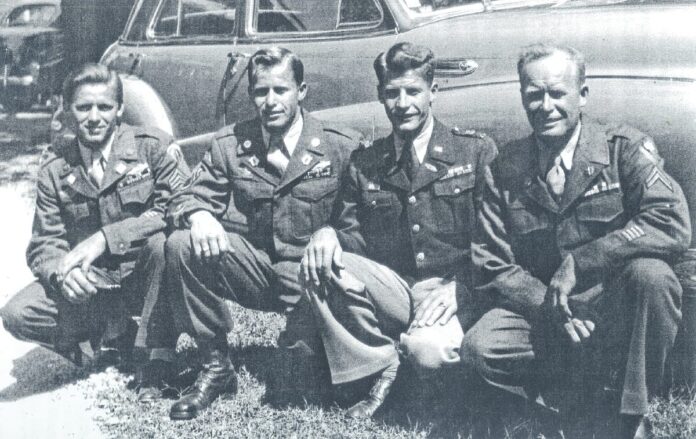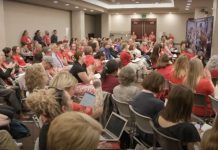
Seventy-five years ago today, Allied Forces began to win World War II in a definitive battle that would cost tens of thousands of lives in the costliest war ever fought.
Today’s milestone anniversary is reminding people all over the world of the importance of the D-Day landing at Normandy and the sacrifice and heroism at Omaha Beach.
One local family continues to learn and appreciate the sacrifice of one of its members who landed there June 6, 1944, served his unit with courage, and returned home to tell the tale.
Although she always knew that her uncle, Leonard “Dick” Trimpe, was one of four sons in their family who served in the war, Bev Rust and her husband, Tom, of Columbus, decided the time had come this year to see Normandy and the memorials in France for themselves.
[sc:text-divider text-divider-title=”Story continues below gallery” ]Click here to purchase photos from this gallery
Rust doesn’t remember her uncles ever discussing their war experiences when she was growing up.
It was only later in life that Leonard, as he became more involved in reunions of the 741st Tank Battalion and veterans groups in Jackson County, began sharing his experience that was circulated more widely within the family.
He eventually compiled his experiences into an account he published for the Trimpe family, so that his story and those of his fellow soldiers, would not be lost.
In March, the Rusts visited Normandy and the surrounding area to visit the places where Bev’s uncle risked his life to repair tanks as they landed on the shore, a significant part in his part of his war story.
Normandy, as seen today
Today, Normandy’s coastline is a postcard-perfect seashore, now featuring elegant monuments and memorials dedicated to those who fought in the turning-point battle.
Standing on the beach, just taking it all in, was emotional, Bev Rust said.
“It looks like any other beach except you know the history, and you can visualize all those people coming over the hills near the beach, and the Germans picking them off,” she said.
The memorial monument at Saint-Laurent-sur-Mer, “Les Braves,” represents not only the explosions of the bombs on D-Day, but the spirit of the courageous men who fought and died.
The sheer number of American graves at the Normandy cemetery was humbling, she said.
“Just to walk through that American cemetery — just to look at all those crosses — so many have the date June 6, 1944 — that was a moving experience,” she said.
For Bev and others who grew up knowing World War II veterans, the most important lesson is to never forget what they did and how they changed the world. Their fear is that the legacy, as fewer and fewer veterans remain to tell their stories, will be lost.
“I guess I’m concerned that it’s going to be forgotten. My generation — I’m almost 70 — grew up knowing a lot about the history of World War II, but I’m thinking as we get further and further away in time, many of the next generation may forget,” she said.
The Trimpe brothers go to war
Leonard Trimpe was one of four brothers — in a family of eight children — who went to war. Bev’s father, Clarence, was the youngest son, and didn’t serve in the war, the family believes, because as the youngest in the farming family, he was still needed at home. The brothers who served were Omer, born in 1909, Leonard, “Dick,” born in 1920, Carl, “Bill,” born in 1922 and Lawrence “Tom,” born in 1924.
Carl and Lawrence were teenagers when the U.S. entered the war in 1941.
As Bev toured the memorials in Normandy, she thought of the youth of so many of those who were part of D-Day.
“To think many of them were high school kids or not much older. Going into something like that … they didn’t know what they were signing up for,” she said.
Such was the case throughout the war, and specifically for the D-Day invasion, as well.
In an interview with the Seymour Tribune prior to his death in 2013, Trimpe said he and others were told that the Allies estimated that it would take them a day to move just 18 miles into France, but by the end of the day, the Americans had gained only minimal distance and it ended up taking three or four days to go that 18 miles, he said.
Problems in the landing had abounded from the start. Trimpe’s battalion had attempted to land more than 50 tanks that were specially designed to ford deep water, but only 21 made it to shore, and of those, only five were operational, according to Trimpe’s son, Jeffrey.
In the earlier interview, Trimpe recalled how the tanks were lodged in rocks. His commander asked him to help free one of them once the problem became clear.
“We had to hammer the rocks out of that tank to fix it,” Trimpe said.
Although his later accounts didn’t include the extreme danger he was in or his feelings about it, Trimpe earned a Silver Star for his service in freeing the tanks because the unit was taking heavy fire during the repairs.
Trimpe was not wounded. Asked whether he remembered his father ever talking about how scared he must have felt at the time, Jeffrey said his father didn’t, “but under the circumstances, you’re lucky just to survive something like that.”
In addition to the Silver Star, Trimpe received a Battlefield Citation for his courageous work. He was commissioned to second lieutenant and became maintenance officer. He also received two Presidential Unit citations.
V-E Day
Trimpe’s battalion could be studied as a micro-history of the war. His battlefield commission cites his exceptional courage and abilities throughout campaigns of Normandy, Northern France, Ardennes-Alsace, Rhineland and Central Europe.
“They spent the majority of the war over there,” Jeffrey said.
The battalion was also at the Battle of the Bulge, and later oversaw the re-burial of concentration camp victims, who’d been roughly interred in mass graves.
“Our orders were to stand guard in eight-hour shifts over the German collaborators. They were carrying out the task of digging up the bodies which had been buried under about four feet of soil. The bodies had been placed down and piled three or four bodies deep under some kind of cover in straight lines. There was no dirt or mud on the Holocaust bodies when they were removed,” Trimpe later wrote.
The bodies were removed, individually covered with sheets and re-buried under the battalion’s supervision.
These images would stay with Trimpe for the rest of his life.
After the battalion reached Pilsen, Czechoslovakia, the fighting in Europe ceased two days later. Trimpe and his fellow troops confiscated a hotel from the Germans. Near the hotel was the ammunition site which had been the source for the German army’s weaponry, Trimpe said in his written account.
The hotel was a welcome respite.
“I was able to enjoy sheets on my bed for the first time since I really don’t know when,” he wrote. “About three days later I reported to the medics because I had broken out with scarlet fever. Of course, I was then moved clear out of town and into a large hospital tent. I was assigned to an official army cot on which I slept for about 10 days.”
Shortly afterward, Trimpe was granted leave and visited Omer, Carl and Tom in France (all four would return home safely). He also wrote of visiting a friend in the Red Cross. He wrote that during the trip, he logged some 2,000 miles in his Army jeep, but that the “bumpy ride was well worth it.”
Home, and a legacy
Following the welcome news that his company would not be transferred to Japan, Trimpe finally came home from the war in October 1945.
He began working for Morgan Packing and began his company, Trimpe Trucking, not long after, Jeffrey said. He ran Trimpe Trucking until his retirement in the early ‘80s, when Jeffrey took over the business.
Trimpe married his wife, Leona, in 1950, who was a homefront victim of the war.
Leona was married to Private Gerald B. Eckelman, also from Seymour, who was killed in action in France on July 18, 1944. He posthumously received a Purple Heart. Eckelman was buried in the American cemetery near Omaha Beach at Normandy, and 43 years later, Leona would visit his grave with Trimpe during a 741st Battalion reunion tour of France.
The 741st Tank Battalion began holding reunions in the 1960s, and the surviving members would get together and tell stories of the battles. They also were responsible for erecting monuments to their fallen brothers in arms.
Trimpe was active in the Seymour VFW and American Legion for many years. He gave talks to school groups, and was personally responsible for the installation of military memorials and displays throughout the area.
“When those guys got together, they shared a lot of stories over the years,” Jeffrey said.
He remembers his dad talking about digging holes under the tank to sleep in at night, going deer hunting for food at certain times and other such stories, among the ones about the battles and acts of heroism.
“We slept underneath the (tank) retriever even when it was very cold,” Trimpe said. “We had a lot of fun. We had a lot of bad days, but none of us drank; we got along so good,” he said during the interview from 2009.
Jeffrey grew up with these stories, and now, he’s passed on the importance of the legacy to his son, Jeffrey “Alex” — and Alex’s children.
“We thank everyone for their service — it led us to the life we live in the U.S. now,” he said.
[sc:pullout-title pullout-title=”Leonard Trimpe letter” ][sc:pullout-text-begin]
Leonard Trimpe was a World War II veteran from Seymour who died in 2013 at age 93.
He compiled an account of his war experiences, including serving in the D-Day invasion, and wrote a letter explaining why he decided to write his story and his hopes for the legacy of all who served.
An excerpt:
"We certainly need to actively help future generations understand the great sacrifice of the landing forces, the soldiers on those beaches, and our comrades around the world in World War II. What a different world this world would be had the Axis Powers prevailed…
Tom Brokaw called the World War II vets "The Greatest Generation." These were the people who grew up in the Great Depression during the ’20s and ’30s with (up to 24 percent unemployment) and came of age to go to combat in World War II.
More are leaving us at a rate of 1,000 each day now. I know we cherished the friendship and bond we all shared with each other as a result of the life-and-death reality of what could happen and too often did (happen) during the war. It still saddens me to this day when I think of all the fine young soldiers who gave their lives, during the prime of their lives — D-Day and through the end of the war — all wars for that matter, fighting for the freedom of our country.
So I hope history and patriotism will stay alive for this cause and the people who died for it. I am sure that the Lord had a plan for me, thank God, or I wouldn’t have made it off Omaha Beach on D-Day. Many of my comrades did not…"
[sc:pullout-text-end][sc:pullout-title pullout-title=”To read more” ][sc:pullout-text-begin]
Indiana journalist Ernie Pyle wrote from the D-Day beaches in Normandy. The Republic is republishing several of his columns from that day in today’s edition on Page 4.
If you would like to read more of Pyle’s columns, visit:
https://sites.mediaschool.indiana.edu/erniepyle/wartime-columns/#WartimeColumns
[sc:pullout-text-end]



